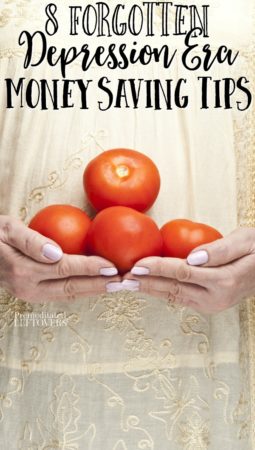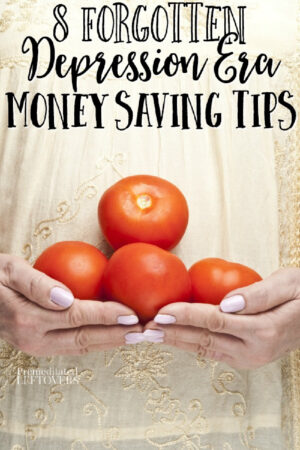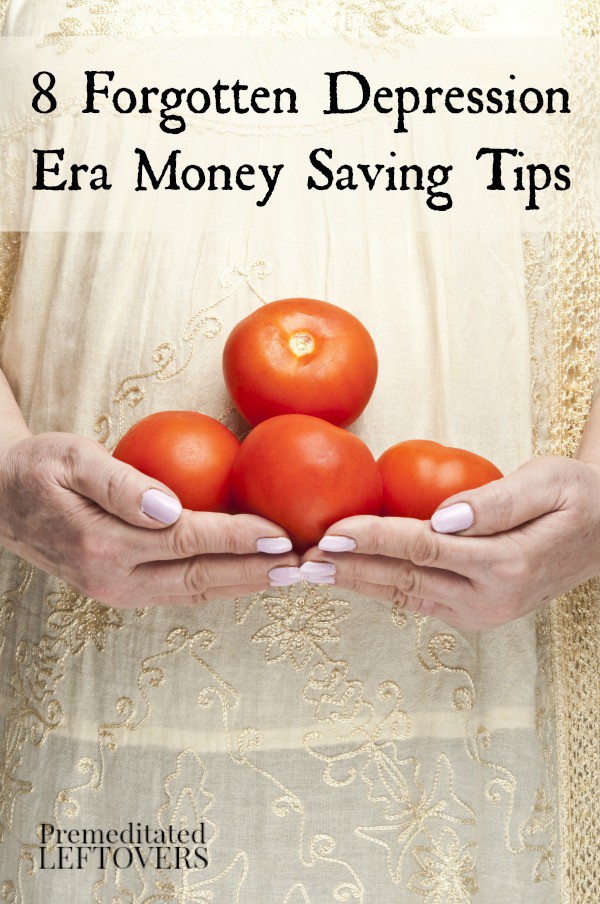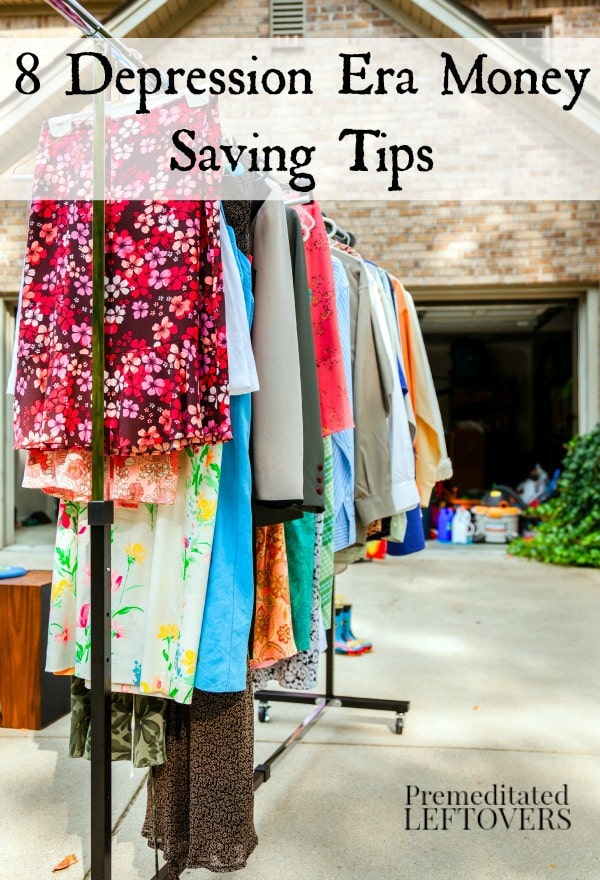You can start using these Great Depression Era money-saving tips today!
When most people think of the height of frugal living, the depression era is often the #1 time they think about. It was a time when most people didn’t waste anything, used their creativity and ingenuity to solve problems and managed to make it through, even when times were extremely tough and budgets simply did not exist because there was nothing to spend.
When I think of the depression era, I am reminded of how much we waste now and how they managed to use everything without even a complaint. It just was the way things were and everyone contributed to the household. If you would like to employ some good, old-fashioned money-saving tips that they used in the depression era to save your household some money, here are 10 forgotten Depression Era money-saving tips to start using now.
8 Depression Era Money Saving Tips
Learn the art of haggling.
People in the depression era didn’t just take the first quoted price for something. They knew how to trade, haggle, and make deals. We may not haggle these days outside of the car lot, but that doesn’t mean we can’t save money on the things we want. I keep notes of the items I need and then watch for sales on them. But it never hurts to ask when a store’s next sale will be.
Trading is starting to come back. More stores are offering to give you credit on used electronics when you are upgrading. Some stores buy back CDs, Vinyl Records, Books, or DVDs. Others buy back gaming equipment or phones. When you need a new item, see if you can, at least partially, fund it with something you no longer use.
While most of us are not comfortable haggling, you can use the internet to find the best price on an item. If you can offer proof of that price, some stores have a price matching guarantee.
Don’t shop for fun.
Recreational shopping wasn’t really an option for most people during the Great Depression. It is amazing how much money we waste when we shop because we are bored. Make it a habit to not do so. Bored? Pick up a deck of cards, work on a puzzle, call a friend, read a book, work in the garden, or choose another no-cost hobby to entertain yourself.
Buy used.
Many families bought things that their neighbors no longer needed in order to save money. This should be a priority for you if you are looking to save money especially when it comes to things like kids’ clothing, seasonal items, and even household basics. Check out your local thrift stores, Craigslist, eBay, or even Facebook Marketplace.
Shop locally.
You may be surprised by how cheap things are when you buy from local stores. Many people shop at big box stores because we have been trained as consumers to think they are cheaper. The truth is, they are often not cheaper and you can get great deals from local markets. This is usually true of farmers’ markets because you are shopping in-season as well.
Even if the price is higher, you may save money because you do not have to pay shipping costs. Have you ever had your online cart at $23 when the business reminds you that if you spend $35, you will get free shipping, so you buy a $13 item that you don’t really need to save $4.99 on shipping? Yeah, they trick you into spending more because you hate paying shipping costs.
Reduce the use of household products.
Most of us use too much dish soap, shampoo, and lotion as well as many other products. Reduce the amount you use and you may be surprised that it’s enough. This will save you from having to replenish personal care products, beauty products, and cleaning supplies as often.
If you read the back of the bottles, they will often say, “Use a pea-size amount”. Try just following the guidelines on the back of the bottle. Carefully look at the lines on the laundry soap measuring cup. Most of the time, you only need the amount at the lowest line, but we are in the habit of filling the whole cup using 3 – 4 times as much as we need.
My kids always use too much soap when watching their hands, so I fill the soap dispenser halfway with soap, then fill it the rest of the way with water. I put the lid on and then shake to mix the water into the soap.
Stretch your meat or skip it in meals.
Often, families did not have the money to have meat with most meals during the great depression. They stretched what meat they did have with beans and lentils. If you don’t feel you can go meat-free, try ubstituting beans or lentils for half the ground meat in your recipes. You will save money and consume much-needed fiber.
How to Build a Depression Era Pantry
Filling Depression Era Breakfast Recipes
Frugal and Flavorful Depression Era Recipes
Depression Era Tips to Stretch Your Food Budget
Don’t buy disposable things.
Disposable products simply didn’t exist during the Great Depression. Now, we live in a disposable era. But it is easy and much more frugal to trade paper towels for rags and sandwich baggies for reusable containers. Look at the disposable products you are buying and find a reusable resource in your home.
Try some holistic health.
In our grandparent’s time, it was expensive to see a doctor just like it is now, and it wasn’t unheard of to try weird concoctions for healing various ailments. Don’t use any of the disproved methods of former days! However, it may be smart to try things like essential oils for minor ailments before reaching for that medication or going to your doctor’s office for minor things like congestion from a cold.
More Old-Fashioned Money Saving Tips
More Money-Saving Tips from the Depression Era
60 Frugal Hacks from the Great Depression Era
Frugal Depression Era Gardening Tips





Diane says
They are wrong about toilet paper! Using personal hygiene cloths is very soft and comfy, and it is easy to do.
We only use them for pee (we still use paper for poo & periods) but, in a house of mostly girls…it has cut back on our costs, a lot!!!
Lori says
Yup family cloth is awesome. I cut up old t-shirts for it.
Gina says
Along with beans and lentils, pasta can stretch a meal as well as oatmeal…great article!
Vicki says
Don’t forget the humble potato.
Leeann Langlie says
Thanks for letting me remember the greatest generation. I will cherish them always, and their creative, inventive ideas!
Megan says
Things like colds or chest infections you shouldn’t go to the doctor for anyway. They tend to be viral infections so the doctor wont be able to do much. Just drink plenty of water and get some rest. Obviously if it doesn’t get better after a week or so then do seek medical advice.
Kim says
Before using essential oils with the meaning to ingest it, I would defenitely recommend to first look for a reliable suppliers and second to look for very reliable information. Don’t go with the first info you find on the internet. If you’re not sure about essential oils, go for herbs and spices. Lavender and hop for sleeping, a cut onion in your room in times when the flu is running wild (works anteseptic, so i’ve been told), ginger and camomille for an upset stomach,… These things are usually also cheaper compared to high grade essential oils.
I’m from Belgium so we didn’t have the great depression, but we did have war. To much war. At times my grandparents talk about it. How my grandmother and her brother went catching fish and try to sell them door to door (but her brother gave her the tiny fishes so she never sold much). Something my grandparents still do, which I found queer as a kid, they always save their meat till last. When people visited while they were having dinner, they could show that they atleast had meat to eat (the few times they had it at those times). I think our grandparents’s stories are real treasures to learn from. Come to think of it, it might not be a bad idea to write them down…
TaLisa Agayev says
I love this! I agree! Write them down! 💕
Natalie says
Christine, I loved this article. I find that I’m already doing a most of them, but I’m still guilty of shopping for fun periodically. I think that we could all stand to gain a lot from learning from our depression era grandparents.
Kathy Baker says
Thank you for sharing. I too have gotten into saving money by using and reusing. I even made A sugar rub hand cleanser for my sisters for Mothers day last year. Kathy
Vicki says
Can you share the recipe?
Kim Miller says
Not sure if you ever got that recepie, but if so, please share 🙂 Also, I learned years ago that another “cheap” alternative to hand soap is to use bubble bath to refill your soap dispenser. In addition to costing much less than a traditional hand soap refill, it is easier on hands and smells just as good, if not better.
Christy says
Sugar scrubs are easy to make- I use a reusable plastic container with a screw top lid( previous scrub container or some other container.
I mix 2 cups of brown or white sugar, ( not super fine kind.)
3/4 cup oil- I prefer avocado or grape seed oil.
Essential oils of your choice- 14 drops spearmint, 8 grapefruit, and 6 drops cedar wood, but this is where u get creative. Lavender buds.,
Mix and keep small spoon in bathtub or sink to scoop out each use. Measuring spoons are small and work great.
Cindy Savoroski says
thanks so much for sharing all this interesting and almost forgotten helpful reminders.
Brenda says
Good thoughts here. But I think while they may be “forgotten” by many in our society, there is a remanent of us that still holds to those ideas and values. I haggle (politely and batting my eye lashes if needed) almost everything. From garage sales to cars and appliances. Just today I “haggled” on some advertising we are doing for our business and saved us $600. Meat is a very small part of our budget . . . beans are a true staple that gives us the needed protein. As for “holistic” medicine, we choose to eat very healthy and exercise at least 45 minutes a day 5 days a week. We are physically fit and that seems to ward off most serious health issues. And we believe the old adage, “An apple a day keeps the Dr. away.” The best thing anyone can do to stay healthy is to drink lots of water and get plenty of sleep. 🙂
Yvett says
Growing up my parents never bought paper towels. We used dish towels in the kitchen. My grandmother grew up during the depression and she had the “cleanest” trash. She washed and reused foil. She would use old panty hose to hold soap slivers and use them till gone. She had few clothes and only washed once a week and of course line dried her clothes. She was the most frugal person and also the most content.
Vicki says
I can remember my grandmother making her own bars of lye soap.
Tricia says
These are great comments. I have done most of them for several years with great success. One I would add is bartering for goods or services with friends. For years , I didn’t pay for babysitting because I “paid” in home baked bread or a dinner. I also make many cleaning solutions and laundry soap. That saves a lot each month .
Cindy says
We use everything more than once. EVERYTHING.. well, not toilet paper, but everything else. I try to use things until they fall apart or disappear. We gave up paper napkins years ago and I buy white napkins at yard sales or thrift stores so they can be hung outside on my clothes line to bleach out. I love these kinds of things. Thank you for the suggestions.
Hilton says
Thank you I enjoyed this
Valerie says
Christine T, thanks for all of the super information, I love it! Keep at it, girl!